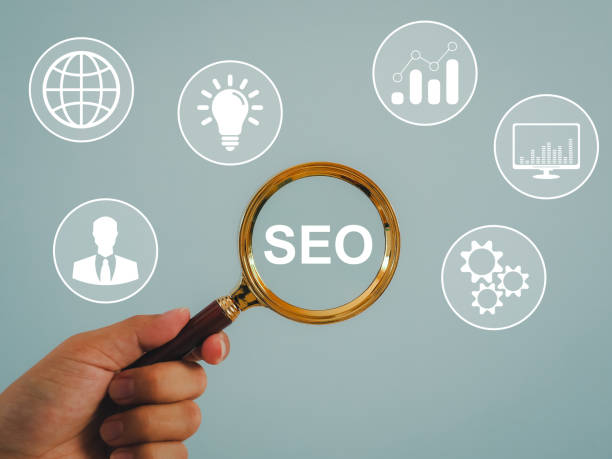What is SEO and why is it important?
What is SEO and why is it important?
SEO or Search Engine Optimization is a set of techniques and strategies used to improve a website’s ranking in search engine results such as Google, Bing, and Yahoo.
The main goal of SEO is to increase organic (unpaid) traffic to the website.
In today’s world, where most users rely on search engines to find information, products, and services, SEO is crucial for a business’s online success.
The importance of SEO can be examined from various aspects:
- Increased Visibility The higher your website ranks in search results, the more likely users are to see it.
- Increased Traffic Higher rankings in search results mean more traffic to the website.
- Improved Credibility Websites that rank high in search results appear more credible to users.
- Improved User Experience SEO techniques often focus on improving the website’s user experience, which can lead to increased user engagement and conversion rates.
- Cost-Effective Marketing Compared to paid marketing methods like pay-per-click advertising, SEO can be a more cost-effective marketing strategy.
In summary, SEO is a powerful tool for increasing online presence, attracting target audiences, and growing a business.
Tired of your company’s website not being seen as it deserves, and losing potential customers? Solve this problem forever with professional and effective website design by Rasawweb!
✅ Increase brand credibility and gain customer trust
✅ Attract targeted sales leads
⚡ Contact us now for a free consultation!
Keyword Research #Very_Important_Part of SEO
Keyword Research #Very_Important_Part of SEO
Keyword Research is the process of identifying and analyzing the words and phrases users type into search engines to find information, products, or services.
This process is one of the main pillars of SEO because it helps you optimize your website’s content around relevant keywords and attract more targeted traffic.
This targeted traffic ultimately increases your sales.
It is very important to perform keyword research well.
Click here to preview your posts with PRO themes ››
The main steps of keyword research include:
- Define Goals Specify what goals you want to achieve with SEO.
For example, increasing website traffic, increasing product sales, or increasing brand awareness. - Identify Seed Keywords Create a list of words and phrases related to your business, products, and services.
- Use Keyword Research Tools Use tools like Google Keyword Planner, Ahrefs, SEMrush, and Moz Keyword Explorer to find more relevant keywords, check search volume, and analyze competition.
- Analyze Competitors Examine which keywords your competitors are using and for which keywords they rank high.
- Select Relevant Keywords Choose keywords based on search volume, competition level, and relevance to your business.
- Group Keywords Group keywords based on topic and intent.
Important tips for keyword research:
- Focus on Long-tail Keywords Long-tail Keywords are longer, more specific search phrases that have lower search volume but higher conversion rates.
- Consider Search Intent Try to understand the user’s intent behind a keyword search and tailor your content accordingly.
- Continuous Updates Keyword research is an ongoing process and should be updated regularly.
By performing proper keyword research, you can optimize your website’s content to attract your target audience and improve your ranking in search results.
On-page SEO: Optimizing Website Structure and Content
On-page SEO: Optimizing Website Structure and Content
On-Page SEO refers to a set of techniques and strategies used to optimize internal website elements to improve rankings in search engine results.
These techniques include optimizing website structure, content, title tags, meta descriptions, URLs, and other internal elements.
On-Page SEO helps search engines better understand your website’s content and display it to more relevant users.
On-page SEO is an important factor in your site’s ranking.
The most important On-Page SEO factors include:
- Website Structure A logical and user-friendly website structure helps users and search engines navigate your website easily.
- Content High-quality, relevant, and unique content is one of the most important SEO factors.
Your content should meet user needs and provide valuable information. - Title Tags Title Tags define the title of your website pages and should contain relevant keywords.
- Meta Descriptions Meta Descriptions provide a summary of your website pages’ content and should be engaging and persuasive.
- URLs Your website page URLs should be short, descriptive, and contain keywords.
- Images Your website images should be optimized and have alternative text (Alt Text).
- Website Speed Your website’s loading speed should be high, as slow speed can lead to a decrease in conversion rates and search rankings.
- Mobile-Friendly Your website should be optimized for mobile devices, as most users access the internet via mobile.
| Factor | Description | Importance |
|---|---|---|
| Title Tag | Specifies the page title. | Very High |
| Meta Description | A summary of the page content. | High |
| Content | High-quality and relevant content. | Very High |
| URL | Page address. | Medium |
| Site Speed | Page loading speed. | High |
By optimizing On-Page SEO factors, you can help search engines better understand your website and improve your ranking in search results.
Off-page SEO: Link Building and #Trust_Building
Off-page SEO: Link Building and #Trust_Building
Off-Page SEO refers to a set of techniques and strategies used to improve a website’s ranking in search engine results through factors outside the website.
These techniques include Link Building, social media marketing, branding, and other activities that help increase your website’s authority and reputation.
Search engines use Off-Page SEO factors to evaluate the credibility and value of a website.
The more authoritative your website is, the higher the likelihood of ranking in search results.
The most important Off-Page SEO factors include:
- Link Building Receiving links from reputable and relevant websites to your website is one of the most important Off-Page SEO factors.
Links show search engines that your website is credible and valuable. - Social Media Marketing Activity on social media can help increase brand awareness and website traffic.
- Branding Building a strong and reputable brand can help increase user and search engine trust in your website.
- Brand Mention Mentioning your brand name on other websites, even without a link, can help increase your website’s authority.
- Reviews and Ratings Receiving positive reviews and ratings from users can help increase trust in your website.
Important tips for Off-Page SEO:
- Quality Over Quantity Receiving links from reputable and relevant websites is more important than receiving a large number of links from low-quality websites.
- Link Diversity Try to receive links from various sources.
- Follow and Nofollow Links Both Follow and Nofollow links can be beneficial for SEO.
By engaging in appropriate Off-Page SEO activities, you can increase your website’s authority and improve your ranking in search results.
Does your current corporate website present a fitting image of your brand and attract new customers?
If not, turn this challenge into an opportunity with Rasawweb’s professional corporate website design services.
✅ Significantly improves your brand’s credibility and image.
✅ Paves the way for attracting leads and new customers.
⚡ For a free and specialized consultation, contact Rasawweb now!
User Experience (UX) Optimization and Its Impact on SEO
User Experience (UX) Optimization and Its Impact on SEO
User Experience (UX) refers to a user’s feelings and perceptions when interacting with a website or application.
A good user experience means that the user can easily access the information they need, enjoy the website, and achieve their goals.
UX Optimization is the process performed to improve a website’s user experience.
User Experience (UX) and SEO are two related and complementary concepts.
In the past, SEO primarily focused on technical and content optimization of websites for search engines.
However, today, search engines like Google also place great importance on website user experience.
A website with a good user experience is likely to have a higher ranking in search results.
Important factors in user experience optimization:
- Website Speed Website loading speed is one of the most important factors for user experience.
Users expect websites to load quickly. - Responsive Design Your website should be optimized for various devices (mobile, tablet, desktop).
- Easy Navigation Users should be able to easily navigate your website and access the information they need.
- Readable and Engaging Content Your website content should be readable, engaging, and relevant to user needs.
- Attractive Visual Design Your website’s visual design should be attractive and professional.
- Accessibility Your website should be accessible to all users, including people with disabilities.
How does UX impact SEO?
- Bounce Rate If users quickly leave your website after landing on it, your bounce rate increases.
A high bounce rate signals to search engines that your website is not engaging for users and may lower your ranking. - Dwell Time If users spend a long time on your website pages, your dwell time increases.
High dwell time signals to search engines that your website is valuable to users and may increase your ranking. - Conversion Rate If users perform actions on your website such as purchasing a product, subscribing to a newsletter, or downloading a file, your conversion rate increases.
A high conversion rate signals to search engines that your website is useful to users and may increase your ranking.
By optimizing your website’s user experience, you can improve your ranking in search results and attract more traffic.
Technical SEO: Optimization for Search Engines
Technical SEO: Optimization for Search Engines
Technical SEO refers to a set of techniques and strategies used to optimize the technical aspects of a website to improve its ranking in search engine results.
These techniques include optimizing website speed, URL structure, XML sitemap, robots.txt file, structured data, and other technical factors.
Technical SEO helps search engines easily find, crawl, and index your website.
Technical SEO is the foundation of SEO.
The most important Technical SEO factors include:
- Website Speed Your website’s loading speed should be high, as slow speed can lead to a decrease in conversion rates and search rankings.
- Mobile-Friendly Your website should be optimized for mobile devices, as most users access the internet via mobile.
- URL Structure Your website page URLs should be short, descriptive, and contain keywords.
- XML Sitemap An XML sitemap helps search engines find and index all pages of your website.
- robots.txt file The robots.txt file tells search engines which pages of your website they should not crawl.
- Structured Data Structured data helps search engines better understand the content of your website pages.
- SSL/HTTPS Using the SSL/HTTPS protocol increases your website’s security and shows search engines that your website is trustworthy.
- Fixing Crawl Errors You should regularly check your website for crawl errors and fix them.
Important tips for Technical SEO:
- Using SEO Tools Use tools like Google Search Console and Bing Webmaster Tools to check the technical SEO status of your website.
- Continuous Updates Technical SEO is an ongoing process and should be updated regularly.
By optimizing the technical aspects of your website, you can help search engines easily find, crawl, and index your website and improve your ranking in search results.
Competitor Analysis in SEO: Identifying Strengths and Weaknesses
Competitor Analysis in SEO: Identifying Strengths and Weaknesses
Competitor Analysis is the process of examining and analyzing your competitors’ websites, strategies, and performance in SEO.
This process helps you identify your strengths and weaknesses compared to competitors and adjust your SEO strategy accordingly.
Competitor analysis is a vital part of any successful SEO strategy.
The main steps of competitor analysis include:
- Identify Competitors Prepare a list of your main competitors.
These competitors can be websites that rank high for keywords similar to yours or offer similar products and services. - Keyword Analysis Examine which keywords your competitors rank high for.
- Content Analysis Review your competitors’ content and identify its strengths and weaknesses.
- Link Building Analysis Examine which websites your competitors have received links from.
- Social Media Analysis Review your competitors’ activity on social media.
- Technical Analysis Examine the technical aspects of your competitors’ websites.
Competitor analysis tools:
- Ahrefs
- SEMrush
- Moz
- SimilarWeb
By using these tools, you can gain valuable information about your competitors.
| Aspect | Description | How to Analyze |
|---|---|---|
| Keywords | Keywords that competitors rank for. | SEO tools like Ahrefs. |
| Content | Quality and type of competitor content. | Manual review and content analysis tools. |
| Link Building | Links received by competitors. | Backlink analysis tools like Majestic. |
Important tips for competitor analysis:
- Focus on Main Competitors Focus your energy on analyzing your main competitors.
- Continuous Updates Competitor analysis is an ongoing process and should be updated regularly.
By performing proper competitor analysis, you can improve your SEO strategy and surpass your competitors.
Measuring and Analyzing SEO Results: Using Tools and Metrics
Measuring and Analyzing SEO Results: Using Tools and Metrics
Measuring and Analyzing SEO Results is a process in which your website’s SEO performance is evaluated and analyzed.
This process helps you understand how effective your SEO strategy is and what changes you need to make.
Without measuring and analyzing results, you cannot know whether your SEO efforts are yielding results or not.
The most important SEO metrics:
- Organic Traffic The amount of traffic that comes to your website through search engines.
- Keyword Ranking Your website’s ranking in search results for various keywords.
- Bounce Rate The percentage of visitors who leave your website after landing on a page.
- Dwell Time The average time visitors spend on your website pages.
- Conversion Rate The percentage of visitors who perform a specific action on your website (e.g., product purchase, newsletter subscription, etc.).
- Backlinks The number and quality of links from other websites pointing to your website.
- Domain Authority (DA) A score that indicates the credibility and strength of your domain.
SEO measurement and analysis tools:
- Google Analytics
- Google Search Console
- Ahrefs
- SEMrush
- Moz
By using these tools, you can gain valuable information about your website’s SEO performance.
Important tips for measuring and analyzing SEO results:
- Define Goals Before starting measurement, define your goals.
- Regular Measurement Measure your SEO results regularly.
- Accurate Analysis Carefully analyze the results and identify important patterns and trends.
- Corrective Action Based on the analysis results, take appropriate corrective actions.
By measuring and analyzing SEO results, you can improve your SEO strategy and achieve your goals.
Did you know your company’s website is the first point of contact for 75% of potential customers?
Your website is the face of your brand. With **Rasawweb**’s corporate website design services, create an online presence that earns customer trust.
✅ Create a professional and lasting image for your brand
✅ Attract target customers and increase online credibility
⚡ Get free consultation from **Rasawweb** experts!
Latest Changes and SEO Trends in 2024
Latest Changes and SEO Trends in 2024
The world of SEO is constantly changing and evolving, and staying aware of the latest changes and trends is essential for success in this field.
In 2024, several important SEO trends are emerging that you should pay attention to.
One of the most important trends is the use of artificial intelligence in SEO.
The most important SEO trends in 2024:
- Artificial Intelligence (AI) The use of AI in SEO is increasing.
AI can be used for content generation, keyword research, competitor analysis, and other SEO tasks. - Voice Search With the increasing use of voice assistants like Siri and Alexa, optimizing for voice search has become more important.
- Visual Search Visual search is also on the rise.
To optimize for visual search, you should tag your images with appropriate alt text. - Video Content Video content is very engaging and effective.
Using videos in your SEO strategy can help increase traffic and user engagement. - User Experience (UX) As mentioned earlier, user experience continues to be an important factor in SEO.
- Mobile-Friendliness Website optimization for mobile remains a critical factor in SEO.
- E-A-T Google places great importance on E-A-T (Expertise, Authoritativeness, Trustworthiness) of websites.
Important tips for SEO success in 2024:
- Stay Updated Always be aware of the latest changes and trends in SEO.
- Experiment Test different SEO strategies and see what works best for your website.
- Be Patient SEO is a time-consuming process, and its results appear gradually.
By paying attention to the latest changes and SEO trends, you can improve your SEO strategy and achieve success.
White Hat SEO vs. Black Hat SEO: Ethical and Unethical Methods
White Hat SEO vs. Black Hat SEO: Ethical and Unethical Methods
In the world of SEO, there are two main approaches: White Hat SEO and Black Hat SEO.
White Hat SEO refers to ethical techniques and strategies that comply with search engine guidelines, while Black Hat SEO refers to unethical techniques and attempts to deceive search engines to improve website rankings.
Choosing the right SEO method for your business is crucial.
White Hat SEO techniques:
- Producing high-quality and relevant content
- Optimizing website structure
- Optimizing website speed
- Natural link building and acquiring links from reputable websites
- Optimizing user experience
Black Hat SEO techniques:
- Keyword Stuffing: Excessive use of keywords in content
- Buying links
- Duplicate Content: Using duplicate content from other websites
- Cloaking: Displaying different content to users and search engines
- Doorway Pages: Creating multiple pages with similar content to deceive search engines
Why should you use White Hat SEO?
- Sustainability White Hat SEO results are more sustainable, and there is a lower chance of being penalized by search engines.
- Trust White Hat SEO helps build trust between your website and users.
- Long-term Value White Hat SEO helps create long-term value for your website.
Why should you not use Black Hat SEO?
- Penalties Websites that use Black Hat SEO techniques may be penalized by search engines and lose their rankings.
- Loss of Trust Black Hat SEO can lead to a loss of user trust.
- Short-term Results Black Hat SEO results are usually short-term and do not last.
In summary, using White Hat SEO is an ethical and sustainable strategy for improving website rankings in search results, while using Black Hat SEO is an unethical and risky strategy that can lead to your website being penalized.
Frequently Asked Questions
| Question | Answer |
|---|---|
| What is SEO? | SEO, or Search Engine Optimization, is the process of increasing the quality and quantity of website traffic by improving the site’s ranking in organic search engine results like Google. |
| What are the main types of SEO? | SEO is divided into three main categories: On-Page SEO, Off-Page SEO, and Technical SEO. |
| What does On-Page SEO include? | On-Page SEO includes optimizing elements within the website, such as keywords, page title (Title Tag), meta description, content, URL structure, images, and internal links. |
| What is Off-Page SEO? | Off-Page SEO refers to activities outside the website that help improve its ranking, such as backlink building, social media marketing, and brand mentions. |
| What is Technical SEO? | Technical SEO focuses on optimizing the technical aspects of a website to help it be better crawled and indexed by search engines. This includes site speed, mobile-friendliness, site structure, Sitemaps, and the Robots.txt file. |
| What role do Keywords play in SEO? | Keywords are phrases that users enter into search engines. Proper and targeted use of relevant keywords in content and site elements helps search engines understand your page’s topic and display it for relevant searches. |
| What is a Backlink and why is it important? | A backlink, or inbound link, is a link from one website to another. Backlinks act as a “vote of confidence” from other sites for search engines and play an important role in a site’s credibility and ranking, especially if they come from reputable sites. |
| What impact does quality content have on SEO? | High-quality, relevant, comprehensive, and unique content not only attracts and retains users but also shows search engines that your page is valuable. This helps improve rankings, reduce bounce rate, and increase user time on site. |
| Why is site loading speed important for SEO? | Site loading speed is an important ranking factor for Google. Faster sites provide a better user experience, have lower bounce rates, and are preferred by search engines. |
| Is SEO a one-time process? | No, SEO is an ongoing and long-term process. Search engine algorithms are constantly changing, competition is increasing, and site content also needs updating. Therefore, SEO requires continuous monitoring, analysis, and optimization. |
And other services of Rasawweb Advertising Agency in the field of advertising
Smart Custom Software: A new service to increase customer acquisition through the use of real data.
Smart Social Media: Professional optimization for digital branding using marketing automation.
Smart SEO: An effective tool for online growth with the help of Google Ads management.
Smart Website Development: An effective tool for customer behavior analysis with the help of Google Ads management.
Smart Link Building: A combination of creativity and technology to attract customers through custom programming.
And over hundreds of other services in the field of internet advertising, advertising consulting, and organizational solutions
Internet Advertising | Advertising Strategy | Advertorials
Sources
What is SEO?SEO TrainingComprehensive SEO Guide 2024What is Technical SEO?
? Lead your business on the path to digital success with Rasawweb Afarin Digital Marketing Agency. From custom website design to SEO optimization and advertising campaign management, we are with you every step of the way to ensure a powerful and influential online presence. Contact us for a consultation and to begin your business’s digital transformation.
📍 Tehran, Mirdamad Street, next to the Central Bank, South Kazeroon Alley, Ramin Alley, No. 6















